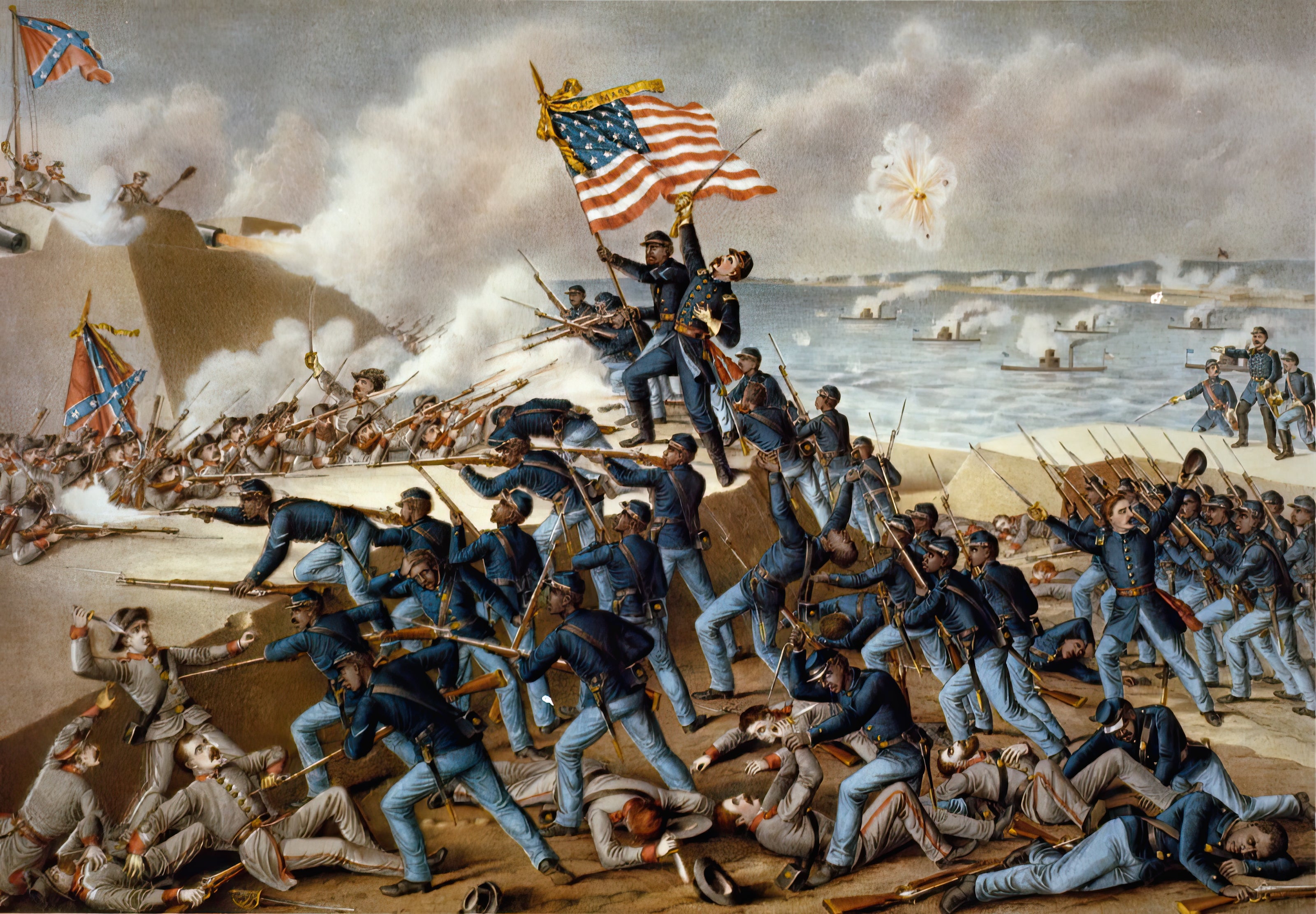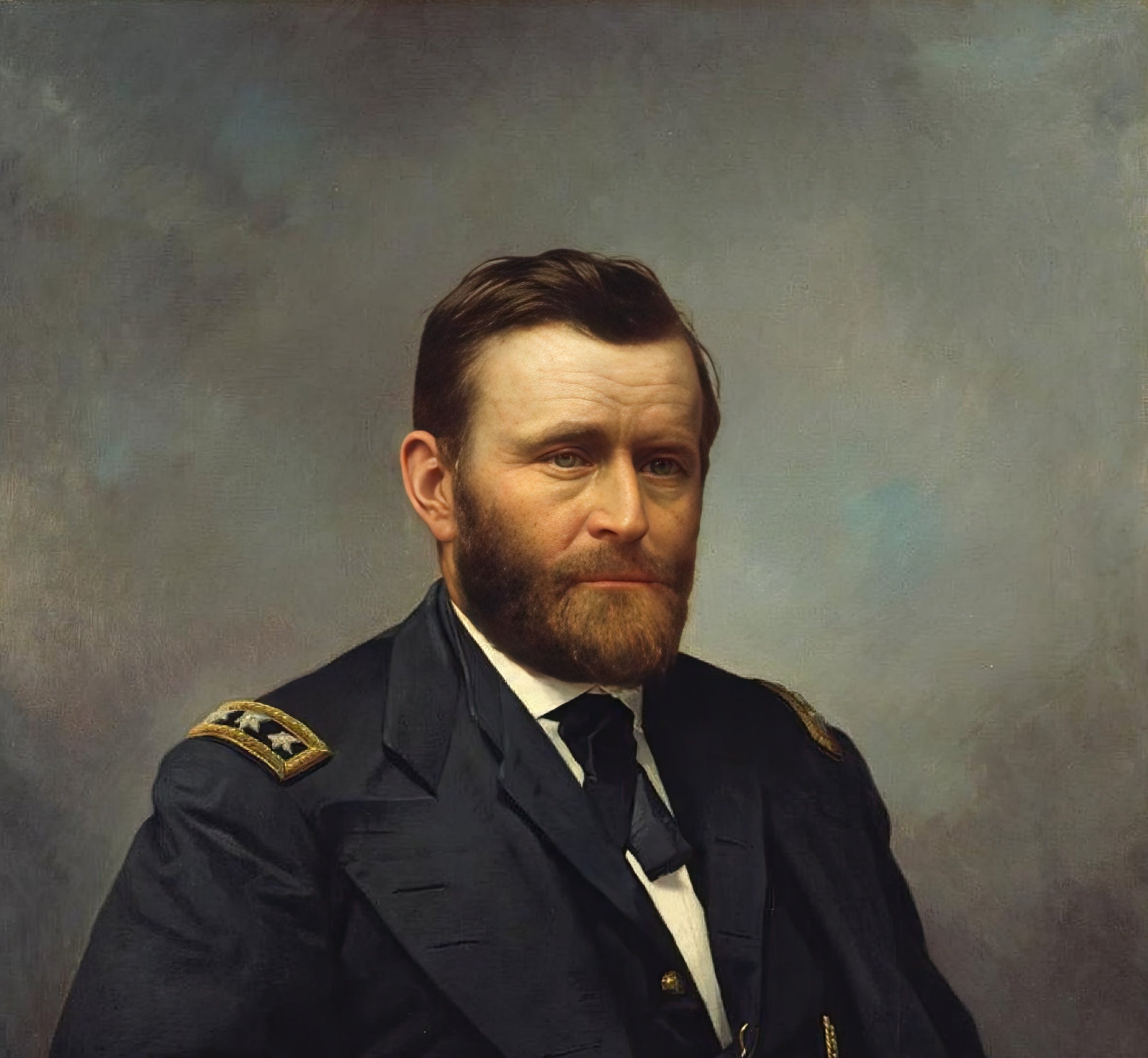
Ulysses S. Grant at West Point (Historical Reprint)
Historical article reprinted from the book "On the Trail of Grant and Lee" written by Frederick Trevor Hill in 1911.
Related Art: Grant Series
Grant's father had obtained his son's appointment to the Academy through the intervention of a member of Congress, who, remembering that the boy was known as Ulysses and that his mother's name before her marriage was Simpson, had written to the Secretary of War at Washington, requesting a cadetship for U. S. Grant. This mistake in his initials was not discovered until the young man presented himself at West Point, but when he explained that his name was Hiram Ulysses Grant and not U. S. Grant, the officials would not correct the error.
The Secretary of War had appointed U. S. Grant to the Academy, and U. S. Grant was the only person they would officially recognize without further orders. They, therefore, intimated that he could either enroll himself as U. S. Grant or stay out of the Academy, making it quite plain that they cared very little which course he adopted. Confronted with this situation, he signed the enlistment paper as U. S. Grant and the document, bearing his name, which thus became his, can be seen today among the records at West Point. This rechristening, of course, supplied his comrades with endless suggestions for nicknames and they immediately interpreted his new initials to suit themselves. "United States", "Under Sized", and "Uncle Sam" all seemed to be appropriate, but the last was the favorite until the day arrived when a more significant meaning was found in "Unconditional Surrender" Grant.
The restrictions and discipline of West Point bore much more harshly on country-bred boys in those years, but to a green lad like Grant, who had been exceptionally independent all his life, the preliminary training was positive torture. It was then that his habitual silence stood him in good stead, for a talkative, argumentative boy could never have survived the breaking-in process which eventually transformed him from a slouchy bumpkin into a smart, soldier-like young fellow who made the most of his not excessive inches. Still, he hated almost every moment of his first year and ardently hoped that the bill for abolishing the Academy, which was under discussion in Congress, would become a law and enable him to return home without disgrace. But no such law was passed and more experience convinced him that West Point was a very valuable institution which should be strengthened rather than abolished.
He had not reached this conclusion, however, at the time of his first furlough, and when he returned to his more and found that his father had procured a fine horse for his exclusive use during his holiday, it was hard to tear himself away and resume his duties. Nevertheless, he did so; and, considering the fact that he was not fond of studying, he made fair progress, especially in mathematics, never reaching the head of his class, but never quite sinking to the bottom. Indeed, if he had not been careless in the matter of incurring demerits from small infractions of the rules, he might have attained respectable, if not high rank in the corps, for he was a clean living, clean spoken boy, without a vicious trait of any kind. Even as it was, he became a sergeant, but inattention to details of discipline finally cost him his promotion and reduced him again to the ranks.
At no time, however, did he acquire any real love for the military profession. His sole ambition was to pass the examinations and retire from the service as soon as he could obtain a professorship at some good school or college. At this, he might easily have succeeded with his unmistakable talent for mathematics, and it is even conceivable that he might have qualified as a drawing master or an architect, if not as an artist, for he was fond of sketching and some of his works in this line, which have been preserved, show a surprisingly artistic touch.

Graduation day at the Academy brought no distinguished honors to Grant, where he stood twenty-first in a class of thirty-nine, but it did win him one small triumph. The West Point cadets are trained for all arms of the service, sometimes doing duty as infantry, sometimes as artillery, and at other times acting as engineers or cavalry; and during the closing week of the year, they give public exhibitions of their proficiency before the official visitors. On this particular occasion the cavalry drill was held in the great riding hall, and after the whole corps had completed their evolutions and were formed in line ready to be dismissed, the commanding officer ordered an extraordinarily high hurdle to be placed in position, and while the great throng of spectators were wondering what this meant they heard the sharp command, "Cadet Grant."
A young man of slight stature, not weighing more than a hundred and twenty pounds, and mounted on a powerful chestnut horse, sprang from the ranks with a quick salute, dashed to the further end of the hall and, swinging his mount about, faced the hurdle. There was a moment's pause and then the rider, putting spurs to his steed, rushed him straight at the obstruction and, lifting him in masterly fashion, cleared the bar as though he and the animal were one. A thunder of applause followed as the horseman quietly resumed his place in the ranks, and after the corps had been dismissed Grant was sought out and congratulated on his remarkable feat. But his response was characteristic of the boy that was, and the man that was to be. "Yes, 'York' is a wonderfully good horse," was all he said.
A lieutenancy in the engineers or cavalry was more than a man of low standing in the Academy could expect, and Grant was assigned to the Fourth Infantry, with orders to report for duty at Jefferson Barracks, St. Louis, Missouri, at the end of a short leave of absence. The prospect of active service, far from his native state, was anything but pleasing to the new officer; but he had come home with a bad cough, and had he not been ordered to the South, it is highly probable that he would have fallen a victim to consumption, of which two of his uncles had already died. The air of Camp Salubrity, Louisiana, where his regiment was quartered, and the healthy, outdoor life, however, quickly checked the disease, and at the end of two years he had acquired a constitution of iron.
Meanwhile, he had met Miss Julia Dent, the sister of one of his classmates whose home was near St. Louis, and had written to the Professor of Mathematics at West Point, requesting his aid in securing an appointment there as his assistant, to which application he received a most encouraging reply. Doubtless, his courtship of Miss Dent made him doubly anxious to realize his long-cherished plan of settling down to the quiet life of a professor. But all hope of this was completely shattered by the orders of the Fourth Infantry which directed it to proceed at once to Texas. Long before the regiment marched, however, he was engaged to "the girl he left behind him" and, although his dream of an instructorship at West Point had vanished, he probably did not altogether abandon his ambition for a career at teaching. But Fate had other plans for him as he journeyed toward Mexico, where the war clouds were gathering. Lee was moving in the same direction and their trails were soon to merge at the siege of Vera Cruz.
A letter Grant wrote to his cousin R. McKinstry Griffith on September 22, 1839, shortly after his arrival at West Point, provides insights into the life of a military cadet, as well as Grant's own thoughts on the Academy. The letter is held at the Library of Congress. A full transcript can be accessed via The Gilder Lehrman Institute of American History.


































